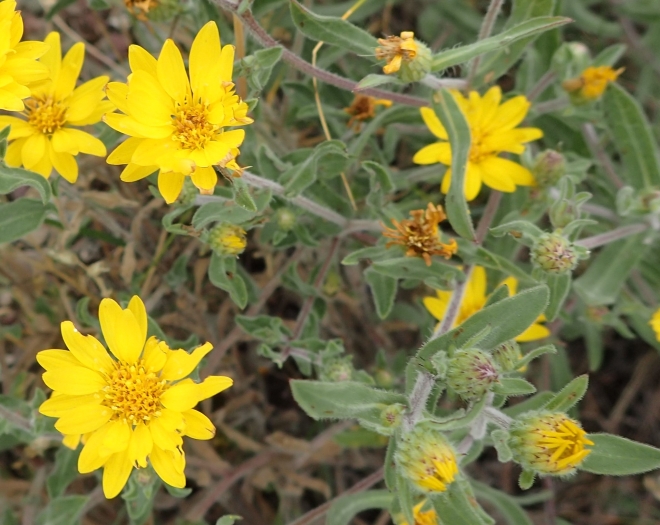Hairy Goldenaster
(Heterotheca villosa)
Hairy Goldenaster (Heterotheca villosa)
/
/

mfeaver
CC BY 4.0
Image By:
mfeaver
Recorded By:
Copyright:
CC BY 4.0
Copyright Notice:
Photo by: mfeaver | License Type: CC BY 4.0 | License URL: http://creativecommons.org/licenses/by/4.0/ | Rights Holder: mfeaver | Publisher: iNaturalist | Date Created: 2019-07-22T17:16:51-07:00 |



















































Estimated Native Range
Summary
Heterotheca villosa, commonly known as hairy goldenaster, is a perennial herb native to a variety of habitats including prairies, open woodlands, and roadsides across central and western North America. It ranges from Ontario west to British Columbia and south to Illinois, Kansas, and into parts of Mexico including Nuevo León and Guanajuato, as well as northern Baja California. This species typically grows to a height of 1 to 3 feet (0.3 to 0.9 meters) and spreads 1 to 2 feet (0.3 to 0.6 meters). Hairy goldenaster has a bushy form with narrow, hairy leaves and produces clusters of small, yellow, daisy-like flowers from late summer to fall. The flowers are quite showy and attract a variety of pollinators.
Hairy goldenaster is valued for its drought tolerance and ability to thrive in poor soils, making it a suitable choice for xeriscaping and naturalized areas. It is also used in restoration projects and wildflower gardens. While it prefers full sun, it can tolerate light shade and requires well-drained soils. Overwatering or poorly drained soils can lead to root rot. It is not commonly affected by serious pests or diseases, but powdery mildew can occur in humid conditions. Hairy goldenaster can self-seed prolifically, which is beneficial for naturalistic plantings but may require management in more formal garden settings.CC BY-SA 4.0
Hairy goldenaster is valued for its drought tolerance and ability to thrive in poor soils, making it a suitable choice for xeriscaping and naturalized areas. It is also used in restoration projects and wildflower gardens. While it prefers full sun, it can tolerate light shade and requires well-drained soils. Overwatering or poorly drained soils can lead to root rot. It is not commonly affected by serious pests or diseases, but powdery mildew can occur in humid conditions. Hairy goldenaster can self-seed prolifically, which is beneficial for naturalistic plantings but may require management in more formal garden settings.CC BY-SA 4.0
Plant Description
- Plant Type: Subshrub, Herb
- Height: 0.7-3 feet
- Width: 1-2 feet
- Growth Rate: Moderate
- Flower Color: Yellow
- Flowering Season: Summer, Fall
- Leaf Retention: Deciduous
Growth Requirements
- Sun: Full Sun
- Water: Medium
- Drainage: Fast
Common Uses
Bee Garden, Butterfly Garden, Fire Resistant, Groundcover, Low Maintenance, Rock Garden, Salt Tolerant, Showy Flowers
Natural Habitat
Native to prairies, open woodlands, and roadsides
Other Names
Common Names: Hairy False Goldenaster, Chrysopside Velue, Chrysopside Villeuse, Hairy Goldaster
Scientific Names: , Heterotheca villosa, Chrysopsis villosa, Chrysopsis foliosa, Chrysopsis villosus, Heterotheca villosa var. foliosa, Heterotheca foliosa, Chrysopsis villosa var. villosa, Chrysopsis mollis, Chrysopsis villosa var. foliosa
GBIF Accepted Name: Heterotheca villosa (Pursh) Shinners